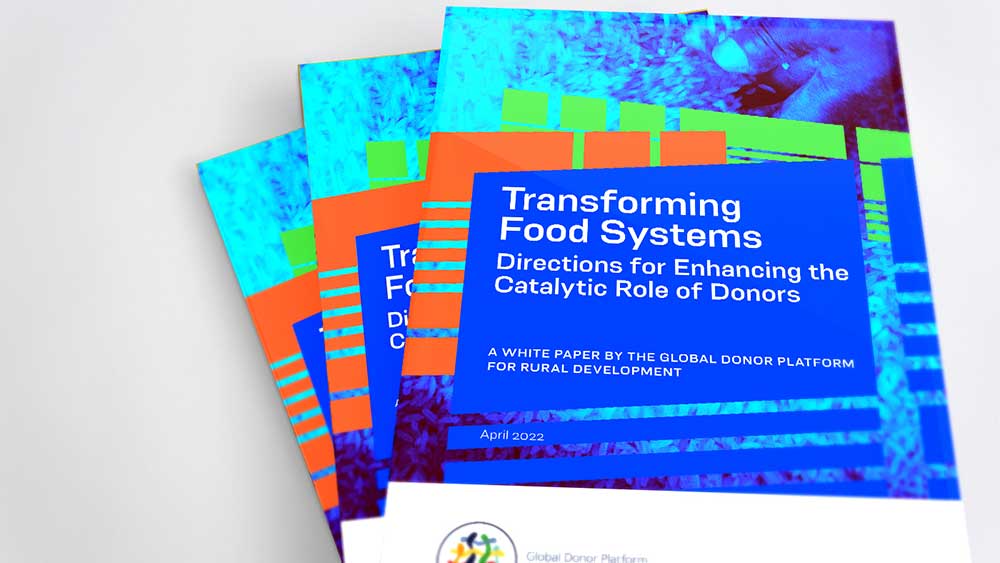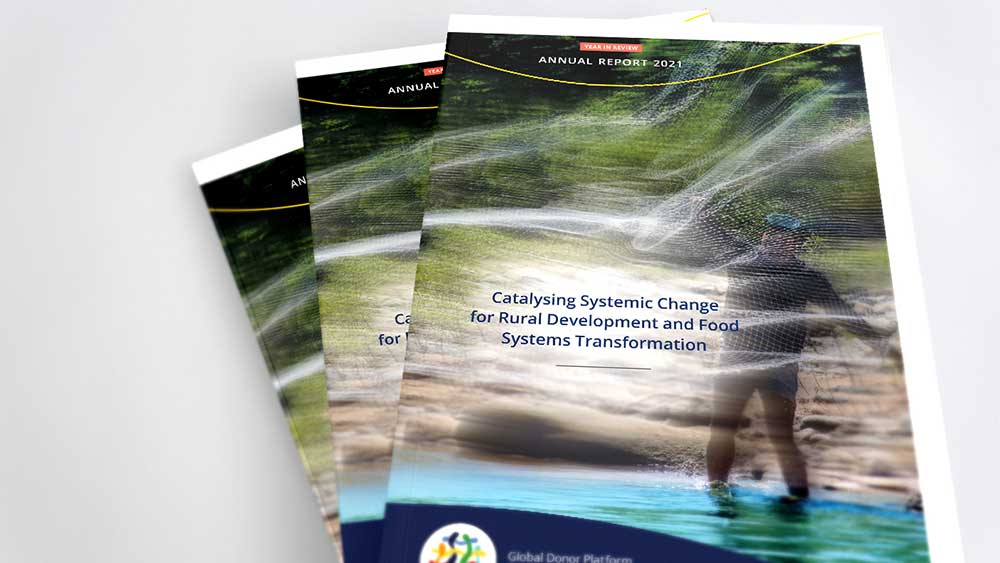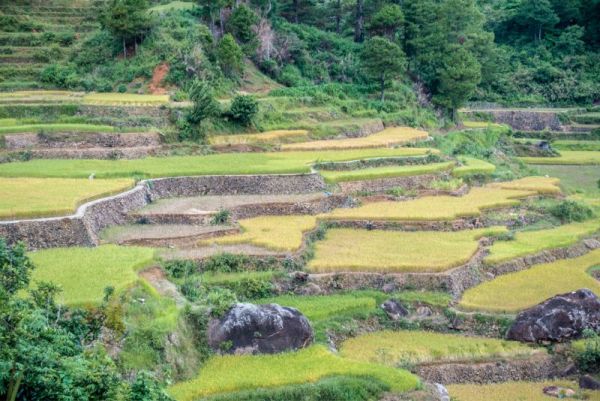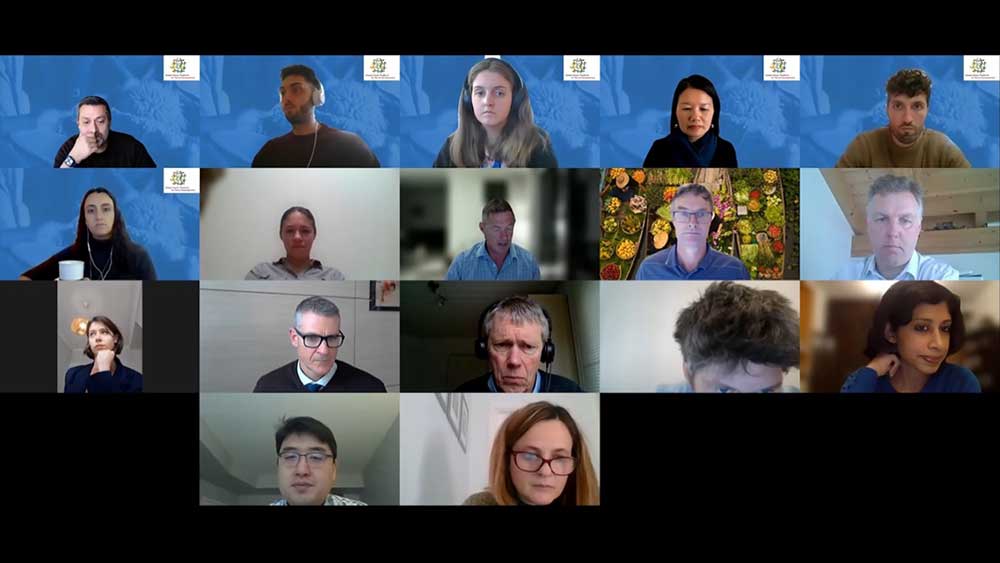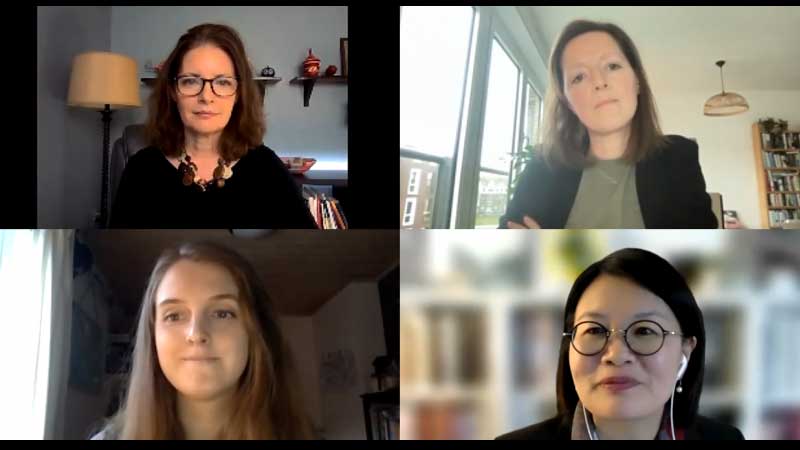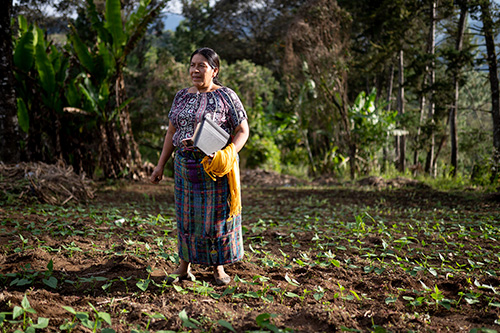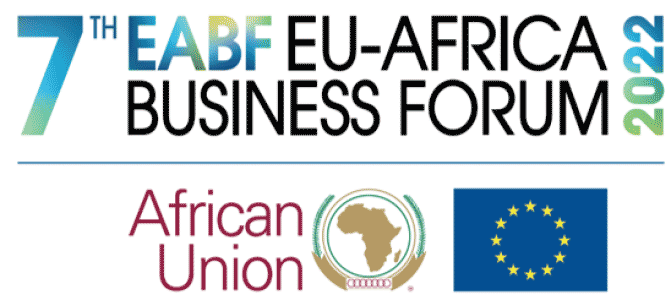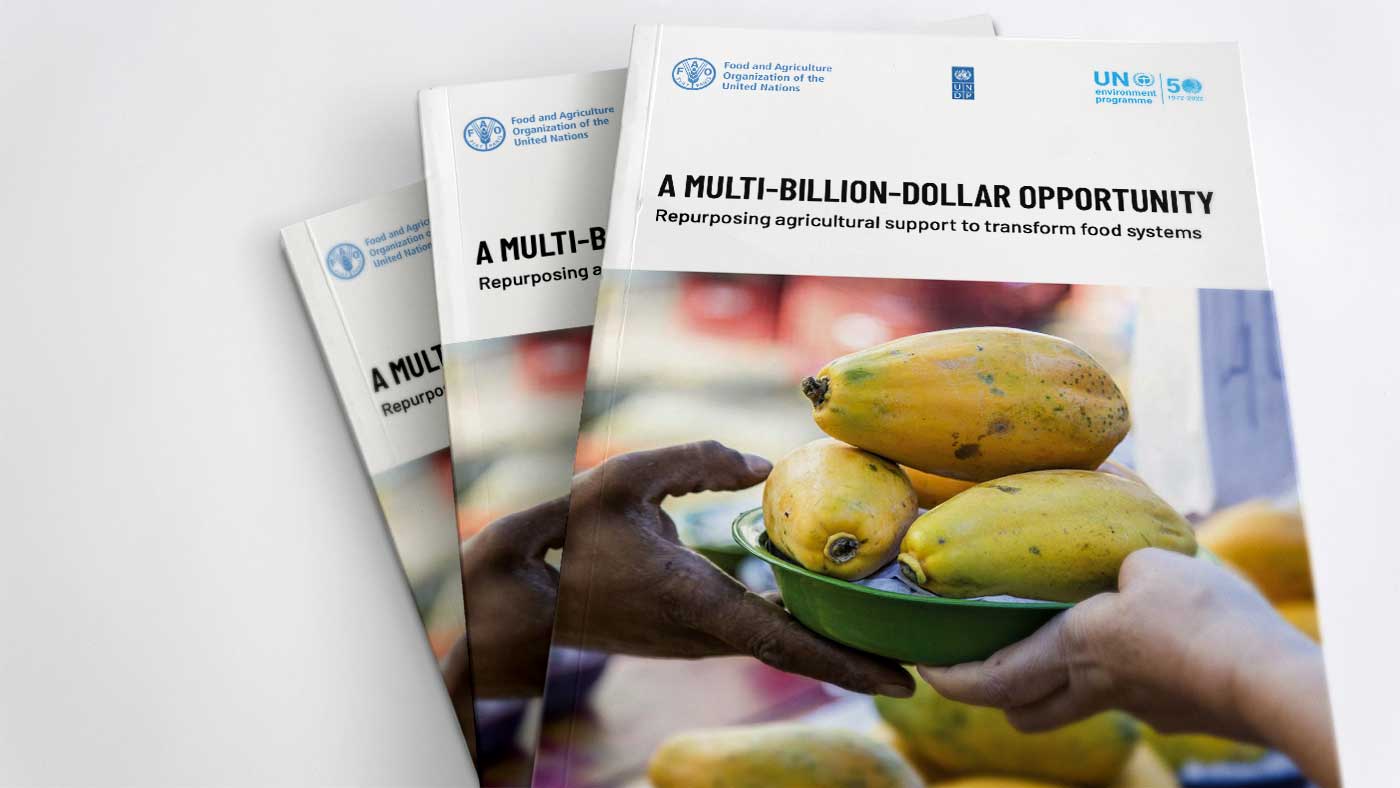# OUT NOW #PLATFORM LAUNCHES WHITE PAPER ON “TRANSFORMING FOOD SYSTEMS: DIRECTIONS FOR ENHANCING THE CATALYTIC ROLE OF DONORS”
A white paper on donor coordination on food systems by the GDPRD was released on 5 April, presenting options and recommendations for the donor community to work together and use its catalytic role to transform food systems. The paper – “Transforming Food Systems: Directions for Enhancing the Catalytic Role of Donors” – provides 7 action areas for how donors can support food systems transformation and follow up to the recommendations of the 2021 UN Food Systems Summit. Based on the work and findings of the Platform over the last two years, the paper offers a set of responses and priorities for donor engagement and a menu of options for future donor commitments. WEBLINK2021 ANNUAL REPORT
The Platform 2021 Annual Report – “Catalysing systemic change for rural development and food systems transformation” – summarizes a very eventful year, both at the operational level and through external engagement. The year in review charts the Platform’s activities from the release of its new Strategic Plan (2021–2025) to the nomination of the new Platform co-chair. Highlights include the high-level food systems event on “The Role of Donors in Food Systems Transformation,” and a donor roundtable on “Supporting Country-level Food Systems Transformation Pathways.” The Platform also launched the stocktaking report on “Donor Contributions to Food Systems” and a Donor Declaration of Intent on Food Systems Transformation. WEBLINKIMPLICATIONS OF THE UKRAINE/RUSSIA CONFLICT FOR GLOBAL AGRICULTURAL MARKETS The conflict in Ukraine is devastating and its impacts have far-reaching consequences, particularly for rural populations in food insecure situations. To understand potential impacts, FAO has prepared an information note on the role of Ukraine and the Russian Federation for global agricultural markets. These two countries are among the most important producers of agricultural commodities in the world and play leading supply roles in global markets of foodstuffs and fertilisers, where exportable supplies are often concentrated in a handful of countries. WEBLINKOVERCOMING THE THREATS TO GLOBAL FOOD SYSTEMS FROM RUSSIA'S INVASION OF UKRAINE The war between Ukraine and Russia has the potential to spark a global food security crisis driven by two factors: skyrocketing food costs for consumers and fertilizer costs for producers. This crisis demands an immediate global response to provide relief in the short term, as well as policy changes to diversify the world’s food markets over the long term to build resilience and avoid future crises. Shocks and crises have become the new norm, which calls for a fundamental reconsideration of how food is produced, traded, and consumed, and a need to diversify where and how food, fertilizer, and energy needs are sourced. WEBLINK# RECENT HIGHLIGHTS #CERES2030: STOCKTAKING AND BRAINSTORMING ON FUTURE ACTION AND INITIATIVES
The SDG2 Roadmap Thematic Working Group organized a virtual workshop with the Ceres2030 team on 14–15 February. The workshop resulted in a strong discussion around opportunities for taking the Ceres2030 agenda forward in a changing development landscape. The shift toward investments in climate, health and recovery from the pandemic, and the lack of additional funding for food security must be acknowledged in the context of achieving Agenda 2030. The GDPRD and Ceres2030 will convene participants again to continue this dialogue that will shape the next phase of the Ceres2030 initiative. WEBLINKPRESENTATION TO THE CFS BUREAU The GDPRD presented at the CFS Bureau and Advisory Group Meeting on 18 March 2022 during the Substantive Segment “SDG 2 and financing for sustainable development” along with IFAD and the World Bank. Maurizio Navarra, Coordinator of the Platform Secretariat, provided an overview of the GDPRD and its recent engagement in the food systems agenda. In particular, the flagship products were presented to illustrate the Platform’s groundwork, commitment and recommended action areas for donor coordination to leverage change in food systems transformation. WEBLINKBOARD MEETING 22 February 2022
The Platform held a virtual Board meeting on 22 February 2022. Board members opened the meeting with a discussion on the finalization of the white paper. The Work Plan for 2022 and the Annual Report for 2021 were presented and discussed. The Secretariat provided an overview of the new communications strategy. Chairs from all Thematic Working Groups participated in the meeting to present on ongoing activities and the status of the different groups. WEBLINKINTERVIEW: WORKING TOGETHER TO BRING LAND GOVERNANCE TO THE HEART OF RURAL DEVELOPMENT SOLUTIONS
The Global Donor Working Group on Land (GDWGL) Chair, Karol Boudreaux of USAID, and Vice-Chair, Gemma Betsema of the Dutch Government, joined the Secretariat for a conversation about land tenure and governance and the potentials of donor coordination in this field. Karol emphasised the need for donors to see land governance as a fundamental cross cutting issue that supports multiple global agendas relating to rural areas and rural development. WEBLINKPUTTING LAND HIGH ON THE INTERNATIONAL DEVELOPMENT AGENDA: DEVELOPING THE STATE OF LAND TENURE AND GOVERNANCE REPORT
Led by the Global Donor Working Group on Land (GDWGL), a virtual workshop was organized with key stakeholders on the development of the State of Land Tenure and Governance Report. A major challenge remains to ensure that land is high on the policy agenda. By demonstrating the importance and centrality of land governance and land security and documenting these aspects, a global report can mobilize stakeholders to increase their commitments to land tenure rights. This has the potential to bring together a wide variety of stakeholders and address the unequal power dynamics in land tenure. WEBLINKACHIEVING THE G7 ELMAU COMMITMENT IN THE CONTEXT OF THE COVID-19 PANDEMIC AND CLIMATE CHANGE This policy brief lays the grounds for the G7 Elmau Commitments to be met by 2030. Hunger levels are rising due to worsening conflict, economic downturns from COVID-19, increasing frequency and severity of extreme weather-related events, high food prices, and inflation. Since the 2015 G7 Elmau commitment to lift 500 million people out of hunger and malnutrition, G7 countries have increased their spending on emergency food assistance but have not increased spending for longer-term investments in agriculture and food security. To meet the Elmau commitment, the G7 together with other development partners must mobilize an additional USD 14 billion per year on average until 2030, on top of current spending. WEBLINKYOUTH EMPLOYMENT AND ENTREPRENEURSHIP IN SUSTAINABLE AGRI-FOOD SYSTEM TRANSFORMATION IN AFRICA (SEMINAR)
On 15 February 2022, members in the Thematic Working Group on Rural Youth Employment from the GIZ Global Project on Rural Employment with a Focus on Youth co-organized a side event to the 7th EU-Africa Business Forum (EABF22) on “Youth Employment and Entrepreneurship in Sustainable Agri-Food System Transformation in Africa”. The seminar brought together policy makers, youth representatives, business managers and development practitioners to discuss main challenges and solutions for youth employment in sustainable agri-food systems. WEBLINKA MULTI-BILLION-DOLLAR OPPORTUNITY: REPURPOSING AGRICULTURAL SUPPORT TO TRANSFORM FOOD SYSTEMS
This report, launched by the Food and Agriculture Organisation (FAO), the UN Development Programme (UNDP) and the UN Environment Programme (UNEP) finds that 87% of current support to agricultural producers, approximately USD 540 billion per year, include measures that are often inefficient, inequitable, distort food prices, hurt people’s health, and degrade the environment. This report provides evidence on the benefits of repurposing negative agricultural support rather than eliminating it altogether. WEBLINK# COMING UP IN THE GDPRD #EVENT: THE INCREASING IMPERATIVE FOR RESILIENT FOOD SYSTEMS IN TIMES OF CRISIS: WHAT CAN DONORS DO? 20 April 2022 The recently-released white paper will be presented at a special event on 20 April. In both the short- and long-term, global donors can use their catalytic and leveraging potential to effectively support food systems transformation and resilience. The current crises environment we are facing highlights even more the need for food systems transformation and improved resilience. The white paper will be the basis for a panel discussion on what donors can do to build longer-term development perspectives in a time of crises. WEBLINKWEBINAR: GREEN JOBS FOR RURAL YOUTH 25 April 2022 Agriculture and food systems need to transform in ways that produce sustainable and inclusive practices and outcomes, including more and better jobs for young women and men. Promoting green jobs for and with rural youth can contribute to such a transformation, while helping address the underemployment crisis and acknowledging and further engaging youth in agriculture, food and associated sectors. A webinar by the GDPRD Thematic Working Group on Rural Youth Employment will be held on 25 April (15.00 – 16.30 CET), to discuss the topic of Green Jobs for Rural Youth. WEBLINK2022 ANNUAL GENERAL ASSEMBLY (AGA) 14–15 June 2022 The 2022 Annual General Assembly (AGA) will be held on 14–15 June in Rome, at IFAD HQs. This year’s AGA – which will be in hybrid format, both virtual and in-person – will be critical to advance the Platform’s work on Agenda 2030, following last year’s Food Systems Summit and the dialogue on donor coordination on the food systems agenda. The central themes that will be explored in the AGA are country-level coordination, finance, and data for better policy-making. |
